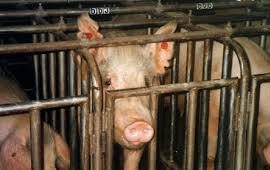Pandemics, Consumption of Animals, and Ag-Gag Laws
Posted on , updated onThanks to the National Review for publishing China’s Wet Markets, America’s Factory Farming by Matthew Scully – a powerful, thought-provoking piece on the consumption of animals as a source of COVID-19 and other pandemics. According to the CDC, it is estimated that 3 out of every 4 new or emerging infectious diseases in humans come from animals (zoonotic). Other zoonotic pandemics include Ebola, Mers, HIV, bovine tuberculosis, rabies, and leptospirosis.

Photo courtesy of Farm Sanctuary
We will always be grateful to Scully for his help in passing Arizona Prop 204. In 2006, ADLA, AZ Humane Society, Farm Sanctuary, and the Humane Society of the US led a grassroots citizen initiative campaign to ban the inhumane confinement of pregnant pigs and calves raised for veal in industrial agriculture operations. That February, the Arizona Republic published Scully’s passionate piece “A Sunless Hell” – a graphic depiction of animal suffering in factory farms and powerful plea to end cruel confinement practices. That November, Arizona voters passed the Humane Farm Animal Act by a landslide margin of 62% to 38%, despite the fact that initiative opponents outspent our coalition by almost two to one.
As Scully suggests, the cruelty humans inflict on animals extends beyond live-animal markets in China to America’s own factory farms where extreme confinement has led to massive antibiotic use and subsequent resistance – an “infectious time bomb.” To prove his point, on April 10th it was reported that workers in a South Carolina commercial meat plant killed over 32,000 turkeys due to an outbreak of highly pathogenic avian influenza H7N3. So far humans have not been widely affected but some health experts expressed concern that this type of virus has the potential to cause a pandemic if it changes and becomes transmissible to humans. Extreme confinement not only affects animals but the people who work in crowded, stressful conditions in industrial slaughter facilities. In South Dakota, a Smithfield pork plant shut down after almost 300 employees contracted COVID-19. The facility, one of the largest in the US, slaughters around 19,500 pigs a day and has a history of animal abuse and environmental damage. As of April 17, at least 634 workers have tested positive, making Smithfield the largest COVID-19 hotspot in the US. Employees and their advocates claim that Smithfield failed to communicate the risks of possible exposure and waited too long to implement safety measures.

Sen. Farley & Rep. Kavanagh speak against ag-gag bill in 2014
In his article Scully points out that following worldwide public outrage over live-animal markets, their owners’ response was to stop people from exposing them. He states, “When the Daily Mail describes how Chinese guards at the live-animal market now “try to stop anyone from taking pictures,” who does that remind us of? How about our own livestock companies, whose entire mode of operation these days is systematic concealment by efforts to criminalize the taking of pictures in or around their factory farms and slaughterhouses?”
This has certainly been the case in Arizona, where the Legislature has attempted to pass numerous bills to silence citizens at the behest of the livestock industry. Animal Defense League of Arizona and other animal protection groups have fought since 2004 against “ag-gag” bills and other legislation to criminalize those who document inhumane treatment of farm animals. Fortunately most of the damaging measures were defeated, but agriculture lobbyists continue to find creative ways of silencing concerned citizens.
